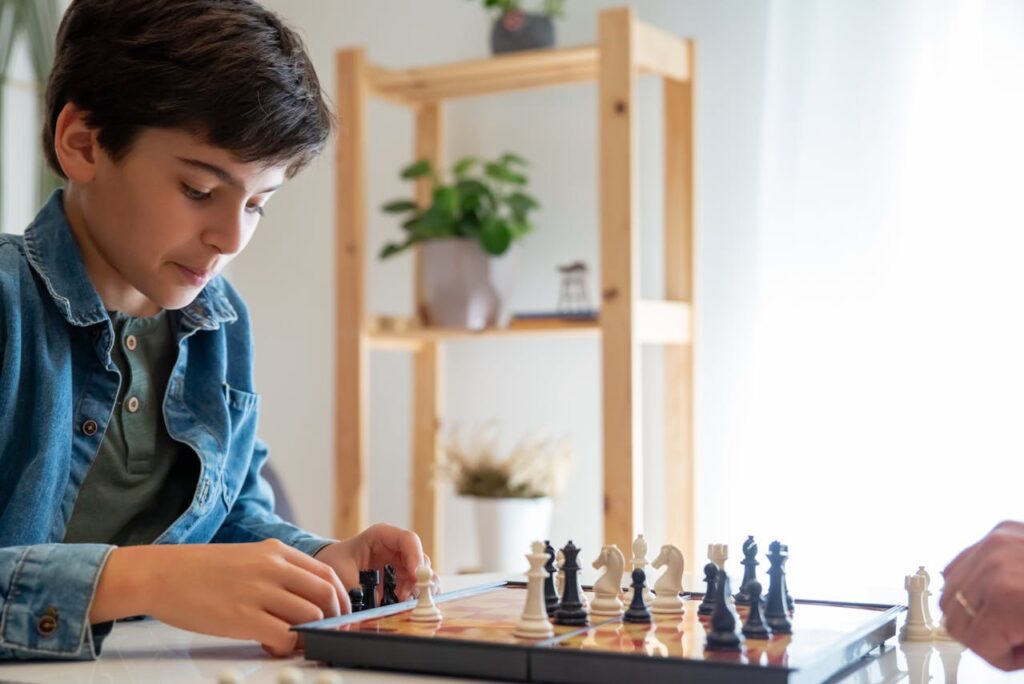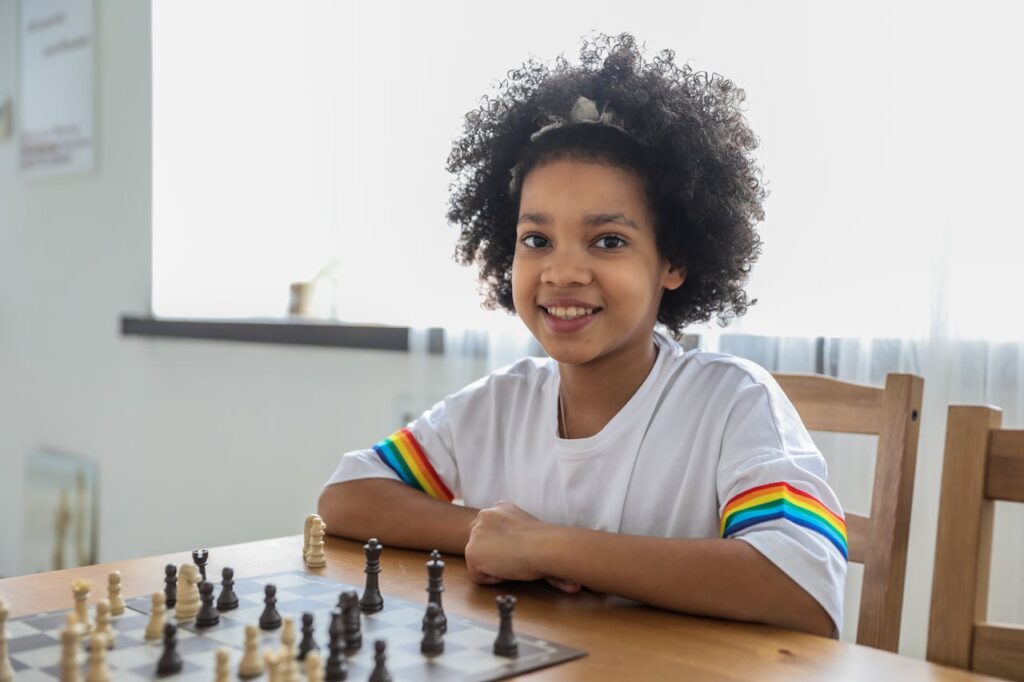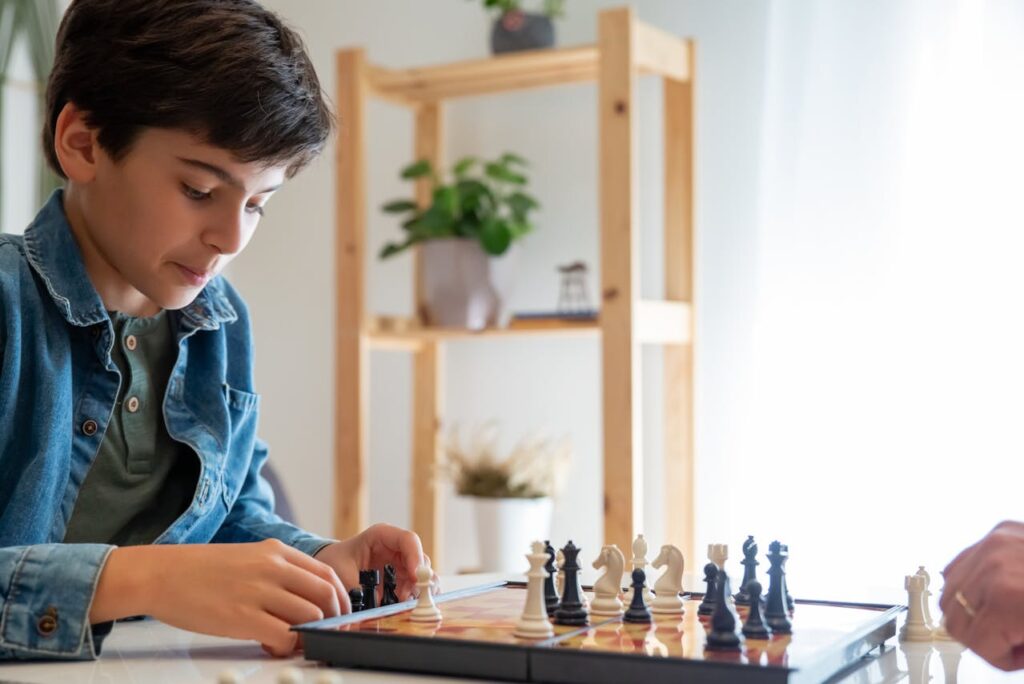In today’s fast-paced world, where children face numerous challenges both academically and socially, building resilience has never been more important.
Resilience is the ability to bounce back from setbacks, adapt to change, and keep going even when things get tough. It’s a quality that helps children manage stress, overcome obstacles, and grow into confident, capable adults.
Learning to Cope with Loss
One of the most immediate and impactful lessons chess teaches is how to cope with loss. Unlike many games where luck plays a significant role, chess is a pure contest of skill, strategy, and mental fortitude.
This means that when a child loses a chess game, it’s often because they were outplayed by their opponent, not because of random chance. While this can be tough, it’s also incredibly valuable for building resilience.
Accepting Defeat with Grace
In chess, losing is inevitable. Even the best players in the world lose games, and it’s an integral part of the learning process.
For children, learning to accept defeat with grace is a crucial step in developing resilience. It teaches them that losing is not the end of the world, but rather an opportunity to learn and improve.
When a child loses a chess game, they must confront their feelings of disappointment, frustration, and even anger.
However, over time, they begin to understand that these feelings are natural and that losing is simply a part of the game.
By repeatedly facing and overcoming the emotional sting of defeat, children build emotional resilience.
They learn that setbacks are temporary and that they have the power to bounce back and try again.
Turning Losses into Learning Opportunities
Another key aspect of resilience is the ability to learn from mistakes and failures. Chess encourages this by allowing players to analyze their games after they’re finished.
Many chess players, both young and old, take the time to review their moves, identify where they went wrong, and think about what they could have done differently.

This process of reflection helps children develop a growth mindset—the belief that their abilities can be developed through effort and learning.
Instead of seeing a loss as a failure, they begin to see it as a valuable learning experience.
This mindset is at the heart of resilience, as it encourages children to keep pushing forward, even when things don’t go as planned.
Building Emotional Control
Chess also helps children develop emotional control, another critical component of resilience.
The game often puts players in high-pressure situations where they must make difficult decisions and manage their emotions.
Whether it’s staying calm when facing a tough opponent or maintaining focus after making a mistake, chess requires players to keep their emotions in check.
For children, learning to manage their emotions during a chess game can translate to better emotional regulation in other areas of life.
They learn that getting upset or frustrated doesn’t help them play better—in fact, it often leads to more mistakes.
Instead, they learn to take deep breaths, stay calm, and focus on finding the best possible move, even under pressure.
Developing Patience and Persistence
Resilience is not just about bouncing back from setbacks; it’s also about the patience and persistence required to keep going, even when progress is slow or obstacles seem insurmountable.
Chess is an excellent teacher of these qualities because the game often rewards those who are willing to take their time, think carefully, and keep pushing forward, even in difficult situations.
Cultivating Patience Through Thoughtful Play
Chess is a game that requires players to be patient. Unlike many other games where quick reflexes or immediate reactions are necessary, chess encourages thoughtful, deliberate play.
Each move requires careful consideration, and rushing often leads to mistakes. For children, learning to take their time and think through their decisions is an important step in developing patience.
This patience is especially important when a child is in a difficult position on the board.

Instead of making a hasty move in frustration, they must learn to assess the situation calmly, consider their options, and choose the best course of action.
Over time, this practice helps children develop the ability to remain patient and composed, even in challenging situations.
Embracing the Long Game
Chess is often described as a “long game,” where success comes from careful planning, strategic thinking, and the ability to see the bigger picture.
In chess, it’s not enough to make one good move—you need to think several moves ahead, anticipating your opponent’s responses and planning your strategy accordingly.
This focus on long-term thinking is an important lesson in persistence.
Children who play chess regularly learn that winning often requires a series of small, incremental gains rather than one big, decisive move.
They learn to stay committed to their strategy, even when immediate results aren’t apparent.
This focus on the long game teaches children that persistence pays off and that success often comes from steady, consistent effort rather than quick fixes.
Overcoming Obstacles with Persistence
Chess is a game full of obstacles—whether it’s an unexpected move by an opponent, a seemingly insurmountable disadvantage, or the challenge of facing a stronger player.
These obstacles require persistence to overcome. For children, learning to face these challenges head-on, rather than giving up, is a crucial part of building resilience.
For example, a child might find themselves in a tough position on the board, with their opponent in a seemingly dominant position.
Instead of giving up or playing recklessly, a resilient chess player will keep looking for opportunities to turn the game around, even when the odds are against them.
This persistence, combined with the ability to adapt their strategy as the game progresses, helps them stay in the game and sometimes even find a way to win.
Building Confidence Through Mastery and Growth
Confidence is a key component of resilience. Children who believe in their ability to overcome challenges are more likely to persist in the face of adversity and less likely to be discouraged by setbacks.
Chess is a powerful tool for building this kind of confidence because it offers clear, measurable progress, and rewards effort and improvement over time.
Gaining Confidence Through Skill Development
One of the most rewarding aspects of chess is that it offers a tangible sense of progress. As children learn the game and practice regularly, they begin to see their skills improve.
They may start by understanding the basic rules, then move on to mastering simple strategies, and eventually develop the ability to anticipate their opponent’s moves and plan several steps ahead.
This progression is not only satisfying but also builds confidence.
Each new skill learned in chess—whether it’s a successful checkmate, a clever trap, or the ability to recognize a particular opening—reinforces a child’s belief in their abilities.
This growing confidence encourages them to take on new challenges, both on and off the board.
As they experience success in chess, they develop the belief that they can succeed in other areas of life as well, whether it’s in academics, sports, or personal goals.
Learning to Trust in One’s Abilities
Chess teaches children to trust in their own abilities. Because the game is so reliant on strategy and independent decision-making, children quickly learn that their success depends largely on their own thinking and choices.
Unlike team sports, where success is shared, chess places the responsibility squarely on the player’s shoulders. This can be daunting, but it also fosters a strong sense of self-reliance.

As children play more chess, they become more confident in their decision-making abilities.
They learn to trust their instincts, analyze situations critically, and make decisions without second-guessing themselves.
This self-trust is a cornerstone of confidence and resilience, as it empowers children to take initiative and face challenges head-on.
Embracing a Growth Mindset
Chess inherently promotes a growth mindset—the belief that abilities can be developed through dedication and hard work.
This mindset is crucial for building resilience because it encourages children to view challenges as opportunities for growth rather than as threats to their self-esteem.
In chess, every game is an opportunity to learn something new. Whether they win or lose, players can always analyze the game, identify areas for improvement, and apply those lessons to future matches.
This continuous cycle of learning and improvement helps children see that effort leads to progress and that setbacks are simply part of the journey toward mastery.
Achieving Milestones and Setting Goals
Chess also offers a clear structure for setting and achieving goals.
As children progress in their chess skills, they can set specific, measurable goals—such as mastering a particular opening, improving their rating, or winning a tournament.
Achieving these goals reinforces their confidence and resilience.

Setting and reaching goals in chess teaches children the importance of persistence, discipline, and hard work. It also shows them that big achievements are often the result of many small steps.
This understanding helps them approach other areas of life with the same goal-oriented mindset, whether it’s achieving academic success, excelling in extracurricular activities, or pursuing personal interests.
Encouraging a Healthy Relationship with Competition
Competition is a natural part of life, and how children handle it can significantly impact their development of resilience.
Chess, with its structured environment and emphasis on fair play, provides an excellent platform for teaching children how to engage in competition in a healthy and constructive way.
Learning to Compete with Integrity
In chess, the rules are clear, and the focus is on strategy, skill, and sportsmanship. There is no room for shortcuts or cheating—winning requires hard work, practice, and honest play.
For children, this environment helps cultivate a strong sense of integrity.
They learn that success is earned through effort and that the best victories come from playing fair and respecting their opponent.
This lesson in integrity is crucial for building resilience. Children who learn to compete honestly are more likely to handle setbacks in a healthy way.
They understand that losing doesn’t mean they’re inadequate; it simply means that they need to work harder and improve.
This mindset helps them avoid the destructive behaviors that can come from an unhealthy obsession with winning at all costs.
Handling Wins and Losses Gracefully
One of the most important lessons chess teaches is how to handle both wins and losses with grace.
In the heat of competition, emotions can run high, but chess encourages players to remain calm, respectful, and focused on the bigger picture.
For children, learning to manage their emotions in this way is a key aspect of developing resilience.
When a child wins a chess game, they experience the joy of success, but they also learn the importance of humility.
Chess players are encouraged to celebrate their victories modestly and to acknowledge their opponent’s efforts.
This balanced approach to winning helps children understand that success is not just about being better than others, but about doing their best and enjoying the game.
Developing a Growth-Oriented Approach to Competition
Chess naturally encourages a growth-oriented approach to competition. Instead of viewing each game as a win-or-lose proposition, children are taught to see every match as a learning experience.
This mindset shifts the focus from the outcome to the process of improvement, helping children build resilience through continuous growth.
For example, after a challenging game, a child might sit down with their coach or parent to review the moves and discuss what went well and what could have been done differently.
This reflection helps them identify areas for improvement and develop strategies for future games.
Over time, they begin to see competition as a way to measure their progress and set new goals, rather than as a source of stress or anxiety.
Building Healthy Competitiveness
While competition can sometimes lead to negative feelings, such as jealousy or frustration, chess teaches children to channel these emotions in a positive direction.
Healthy competitiveness is about striving to do one’s best, pushing personal limits, and respecting the efforts of others.
In chess, children learn that their greatest competitor is themselves. Each game is an opportunity to outperform their previous efforts, to apply new strategies, and to see how much they’ve grown.
This internal focus helps reduce the pressure to constantly compare themselves to others, which can be a major source of stress in more cutthroat competitive environments.
The Role of Chess in Social and Emotional Development
Chess is not just a game of individual skill—it’s also a social activity that brings people together and fosters important interpersonal skills.
Through chess, children learn how to interact with others, manage their emotions, and build relationships—all of which contribute to their overall resilience.
Developing Empathy and Understanding
In chess, understanding your opponent’s perspective is crucial to success. Players must anticipate their opponent’s moves, understand their strategies, and respond accordingly.
This practice of putting oneself in another’s shoes naturally fosters empathy and understanding.
For children, developing empathy through chess can lead to stronger relationships both on and off the board.
They learn to appreciate the thoughts and feelings of others, which helps them navigate social situations more effectively.
This empathy also contributes to resilience by helping children build a supportive network of friends and peers who can provide encouragement and assistance in times of need.
Empathy also plays a role in conflict resolution. In chess, as in life, conflicts may arise—whether it’s a disagreement over a move or frustration after a loss.
Building Strong Relationships Through Shared Interests
Chess clubs, tournaments, and casual games offer children the opportunity to connect with others who share their interests.
These shared experiences can lead to lasting friendships and a sense of belonging, both of which are important for emotional resilience.
Being part of a chess community provides children with a support system where they can share their successes, discuss strategies, and encourage one another.
This sense of community helps children feel connected and valued, which boosts their self-esteem and contributes to their overall resilience.

Managing Emotions in Social Contexts
Chess often places children in situations where they must manage their emotions in a social context.
Whether it’s dealing with the disappointment of losing to a friend or the excitement of winning a tournament, children learn to navigate these emotions while maintaining positive relationships with others.
This ability to manage emotions in social situations is a key aspect of emotional intelligence, which is closely linked to resilience.
Children who develop emotional intelligence through chess are better able to handle the emotional ups and downs of life, communicate effectively with others, and maintain healthy relationships even in the face of challenges.
Fostering a Sense of Belonging
Being part of a chess community—whether it’s a school chess club, an online group, or a local tournament circuit—gives children a sense of belonging and identity.
This connection to a community provides emotional support and a sense of purpose, both of which are important for building resilience.
Children who feel connected to a supportive community are more likely to thrive in the face of challenges.
They know that they are not alone and that they have a network of peers and mentors who are there to help them.
This sense of belonging boosts their confidence, encourages them to take on new challenges, and helps them bounce back from setbacks more quickly.
Conclusion
Chess is far more than a game of strategy—it’s a powerful tool for building resilience in children.
Through chess, children learn to cope with loss, develop patience and persistence, build confidence, engage in healthy competition, and strengthen their social and emotional skills.
These lessons extend far beyond the chessboard, preparing children to face life’s challenges with resilience and confidence.
READ NEXT:
- How Chess Helps Adults Stay Mentally Agile
- Why Chess is the Ultimate Brain Workout for Kids
- Chess as a Tool for Maintaining Mental Sharpness in Later Life
- How Chess Enhances Problem-Solving Skills in Adults
- How Chess Shapes Young Minds: Insights for Busy Parents
- The Unexpected Benefits of Chess for Kids’ Development
- Chess for Calm: Reducing Stress in Kids

